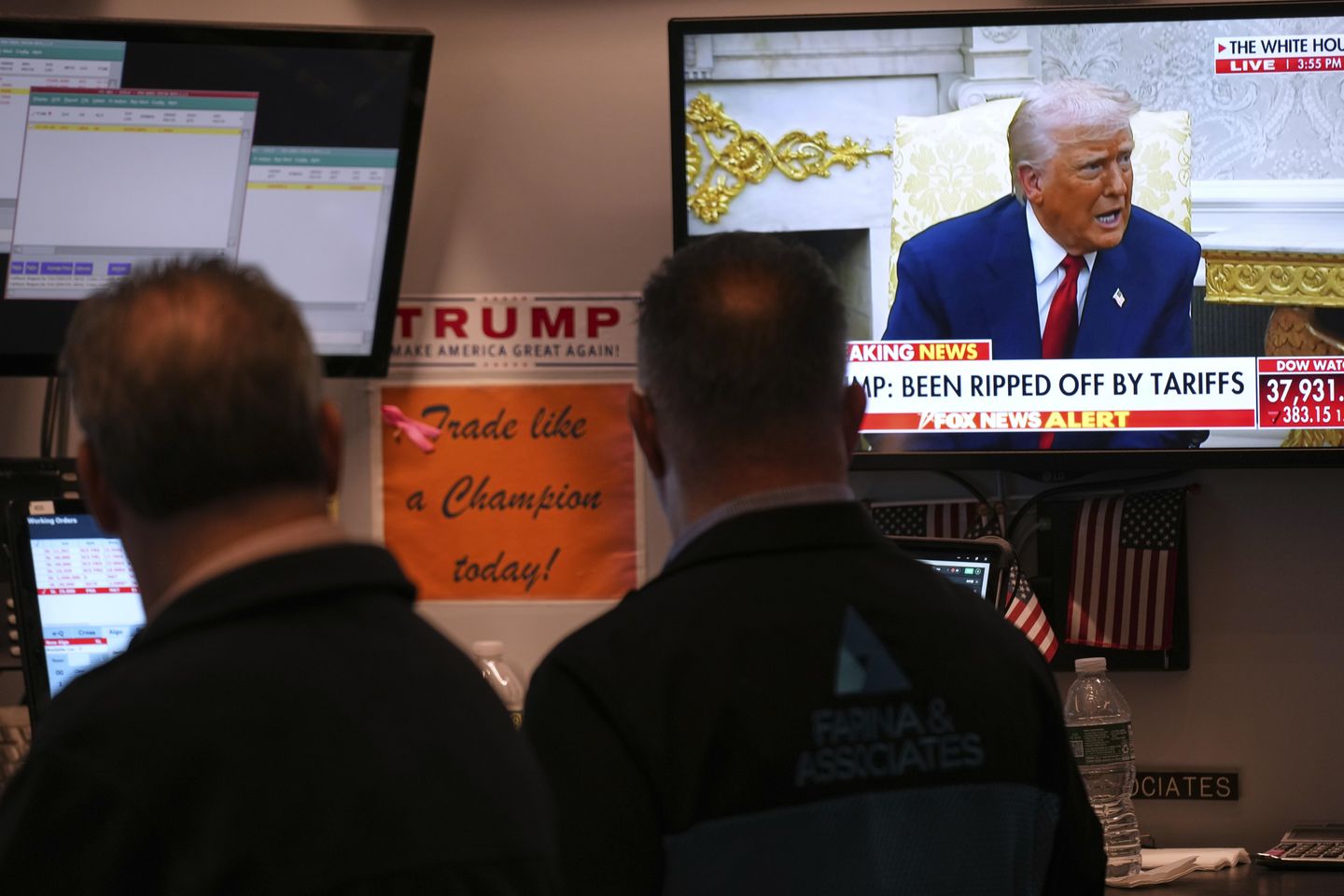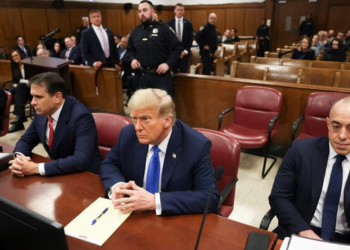
U.S. stocks plunged Thursday due to worries over increasing tariffs on China and overall trade uncertainty, cutting into the midweek rally sparked by President Trump’s decision to pause his reciprocal tariff plan.
The Dow Jones Industrial Average shed over 1,000 points, or 2.5%, and the S&P 500 tumbled 3.5% and the Nasdaq closed down 4.3% even as inflation cooled and the White House boasted of progress in trade talks with dozens of nations.
Wall Street resumed its sell-off as the U.S. and China sank deeper into a trade war.
China faces a 145% tariff on some products, not 125%, because the new levy comes on top of the previously imposed tariff of 20% related to fentanyl, the White House said.
Some products are carved out of the reciprocal tariff but not the fentanyl one, so the situation is complex.
U.S.-bound packages from China valued less than $800 will be subject to a 120% tariff after Mr. Trump closed the “de minimis” loophole that let these parcels move duty-free.
The market sell-off reflects lingering trade uncertainty despite a historic Wednesday rally after Mr. Trump paused his massive reciprocal tariffs on dozens of countries for 90 days.
The White House downplayed the up-and-down in the markets, saying certainty would arrive as they hashed out deals with trading partners.
“Everybody wants to come and make a deal, and we’re working with a lot of different countries, and it’s all going to work out very well,” Mr. Trump said.
He said the U.S. will rake in billions a day in tariff revenue and boasted about a positive inflation report on Thursday.
“We have so many countries to talk to,” Commerce Secretary Howard Lutnick said. “They have come with offers that they never, ever, ever would’ve come with but for the moves that the president has made demanding that people treat the United States with respect.”
Mr. Trump said countries could be subject to his reciprocal tariffs again if they cannot strike deals with the U.S. during the 90-day pause.
Asked if he would extend the pause, he said: “We’ll have to see what happens.”
Nations targeted by the reciprocal tariffs are still subject to a 10% levy, however, and Mr. Trump increased the tariff on Chinese products because Beijing retaliated with an 84% tariff on American goods.
Chinese Foreign Ministry spokesman Lin Jian said Mr. Trump’s tariff on China’s goods and the president’s blanket levy on other nations are a bullying tactic to force nations to make “a compromise or concessions.”
“The U.S., in defiance of global criticism, is pitching itself against the rest of the world,” Mr. Lin said.
Mr. Trump, who showed no sign of backing off China, said he respects Chinese President Xi Jinping.
“I’m sure we’ll be able to get along very well,” the president said. “I think we’ll end up working out something that’s very good for both countries.”
Tariffs are a tax or duty paid by importers on the goods they bring in from foreign markets.
Mr. Trump says tariffs are a great way to force companies to return to America or keep their operations in the U.S., employ American workers and create revenue to fund domestic programs.
Foreign countries don’t pay the tariffs directly to the U.S. Treasury. In many cases, U.S. companies will pay the levies, and they might pass on at least some of the cost to consumers through higher prices.
The White House is leaving in place a 25% tariff on steel and aluminum imports and a 25% tariff on cars not made in the U.S.
Canada and Mexico are still subject to a 25% tariff over the fentanyl crisis, though a range of goods are exempt under the U.S.-Mexico-Canada agreement, according to the White House.
The president of the EU’s European Commission, Ursula von der Leyen, welcomed Mr. Trump’s pause on a reciprocal tariff that would have hit the EU at a 20% rate instead of the baseline 10%.
The EU on Thursday agreed to a 90-day pause on the retaliatory tariffs it approved one day earlier, citing Mr. Trump’s freeze.
“We want to give negotiations a chance,” she said. “If negotiations are not satisfactory, our countermeasures will kick in.”
The White House says China, meanwhile, bullies the trading system with subsidies of certain industries, forced labor and theft of intellectual property.
Vice President J.D. Vance lashed out at critics of Mr. Trump’s policy toward China.
“There is a category of DC insider who wants to fight an actual war with China but also wants China to manufacture much of our critical supply. This is insane,” Mr. Vance posted on X. “President Trump wants peace, but also wants fair trade and more self-reliance for the American economy.”
Mr. Trump said Beijing wants to cut a deal but doesn’t seem to know how, sparking a rebuke from the communist government.
“Intimidation, threat and blackmail are not the right way to engage with China,” Mr. Lin said. “If the U.S. truly wants to talk, it should let people see that they’re ready to treat others with equality, respect and mutual benefit.”












